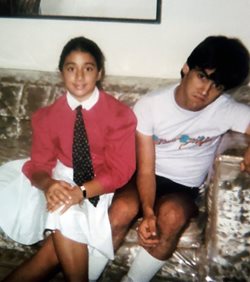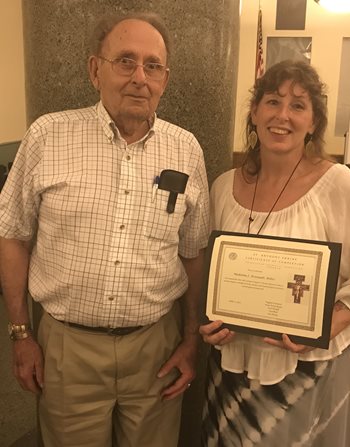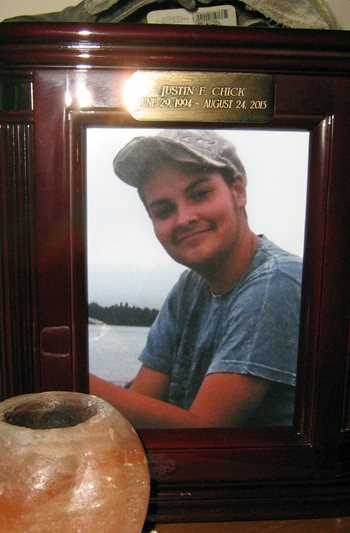Get Inspired
Alfred's gift
 Fatima Garcia, RN, staff nurse, Intensive Care Unit, believes in the power of organ donation. On January 29, 1995, she lost her brother Alfredo (Alfred) Hernandez, who had cerebral palsy and asthma, to an acute severe asthma event at the age of 25. Though his life ended that day, he left a lasting legacy as an organ donor. Alfred's generous gift changed the lives of seven people who needed a transplant.
Fatima Garcia, RN, staff nurse, Intensive Care Unit, believes in the power of organ donation. On January 29, 1995, she lost her brother Alfredo (Alfred) Hernandez, who had cerebral palsy and asthma, to an acute severe asthma event at the age of 25. Though his life ended that day, he left a lasting legacy as an organ donor. Alfred's generous gift changed the lives of seven people who needed a transplant.
“It was a difficult choice for our family,” says Fatima, “but the fact that other people could continue to live because of him really made a difference.”
While Fatima has never met the individuals and families who were affected by Alfred’s organ donations, her family has received letters from those who have benefitted. She knows that his eyes, kidneys, liver, and skin affected the lives of others.
Fatima became a respiratory therapist to care for her brother and has since earned her nursing degree. In her role as an Intensive Care Unit nurse, she occasionally has a chance to share her story with families who are considering organ and tissue donation once they have been contacted by New England Donor Services, the regional organization that coordinates donation.
“If the family says no, you respect their decision, but if they say yes, it's like, there's this box that opens full of gifts that will be given to others,” she adds. “There’s a long list of people waiting for those gifts.”
As a child Alfred said that one day he would be in heaven, where he would function unencumbered by his cerebral palsy. While he may not have been able to imagine touching so many others as an organ donor, Fatima knows that he would be proud of the difference he’s made to so many.
“Donation is a way to help others keep living, to change people’s lives,” she says. “Who wouldn’t want to be a part of that?”
A lifechanging decision
 Madonna Arsenault remembers the moment when her father, Robert Arsenault, Sr., began to give serious consideration to a kidney transplant. It was at one of his medical appointments, after he was told that his kidney function had declined to 13 percent.
Madonna Arsenault remembers the moment when her father, Robert Arsenault, Sr., began to give serious consideration to a kidney transplant. It was at one of his medical appointments, after he was told that his kidney function had declined to 13 percent.
“I said to the doctor, ‘why can’t I give him one of my kidneys?’ The doctor put his hands up in the air and said, ‘why not?’”
For years, Madonna had made it known that she was willing to explore becoming a living kidney donor to save her father’s life, but he was hesitant. He wondered what would happen if one of her children ever needed that kidney, or if a problem arose during the procedure that could change her life. Undeterred, Madonna reaffirmed her commitment to donate. Together, they decided to move forward, a decision that gave Robert four more years to make memories with his family, including his grandchildren and great-grandchildren.
“The decision brought so much joy,” says Madonna. “It’s really hard to describe it, but it brought our family closer together. And even now, three years since Dad died, he’s part of every conversation when our family gets together.”
The two-year journey to donation involved several medical tests and visits with doctors and transplant center staff. There were considerations that went beyond medical care.
“A couple of years before the actual transplant, you have to think about what happens if you’re not a match for your family member,” adds Madonna. “Would you still be willing to give life? For me, the answer was yes. The decision to donate must be truly altruistic.”
These days, Madonna serves as a volunteer Chaplain at Northern Light Eastern Maine Medical Center. As a valued member of the care team, she often talks with families of patients who are faced with decisions about organ donation.
“If they’re open to it, I tell them I’m an organ donor myself,” she says. “I’m able to share how it can make a difference in other people’s lives, even if my situation was different from what families of deceased donors face.”
Madonna notes that becoming a living donor is a lifechanging decision, and potential donors and their families should ask lots of questions to their provider team and consider talking to others who have donated.
“Explore the topic with the medical team,” she adds. “Learn all you can, and ask ‘what’s the process for me or my family member?’ You could be part of the solution for someone who doesn’t have to die.”
Somebody’s miracle

“I heard the heartbeat and I knew right away. I just started crying. It was very emotional because I just didn’t think I would ever hear that again,” recalls Dawn Chick, with her ear pressed against her son Justin’s favorite stuffed bear.
Justin had lost his life in an ATV accident several years earlier, but Dawn was able to hear her son’s heartbeat again because his heart sustains the life of a donor recipient who needed a transplant.
Dawn’s husband worked for more than a year to get a recording of the heartbeat from the recipient of Justin’s heart. Then, the heartbeat was placed on an audio device that was sewn into the stuffed bear. It was a very special Christmas gift for Dawn.
The family’s journey began on August 24, 2013, when Justin was brought to Calais Regional Hospital and then flown to Eastern Maine Medical Center. His family was able to communicate with him at first, but his brain began to swell, and doctors were unable to bring the swelling down. Once it became clear that Justin would not recover, his family began to think about organ and tissue donation.
“We were very fortunate that we had that discussion ahead of time so that when the time came, I knew what he wanted and that I needed to honor those wishes,” says Dawn, noting that Justin asked for the donor designation to be added to his license after he passed his driving test.
“I knew that we were going to be moving on to the next step, and it wasn’t easy, but time was of the essence,” she says.
Justin’s kidneys, liver, pancreas, and tissue saved several lives and improved many others. Dawn has connected with several of the people that Justin’s special gift has helped, and she has become friends with the recipient of his liver.
“I thought I’d be really overwhelmed with emotion, but I was just very happy to see how wonderful she was doing,” she says, recalling her first meeting with the liver recipient. “She let me feel the outline of Justin’s liver. I always thank her for taking the second chance and living her life and enjoying it, because those are the things that Justin would have wanted.”
Justin was known for making people smile when they were going through tough times. He was outgoing and could go into a room of strangers and quickly make friends. Given his good nature, Dawn wasn’t surprised that he wanted to help others.
“He would be humbled to know that these people are so, so thankful,” she adds. “We miss him every day, but to know that he’s living on in all these people and that they are living their lives and they’re seeing their families, I mean, what more could I ask for? He was their miracle.”